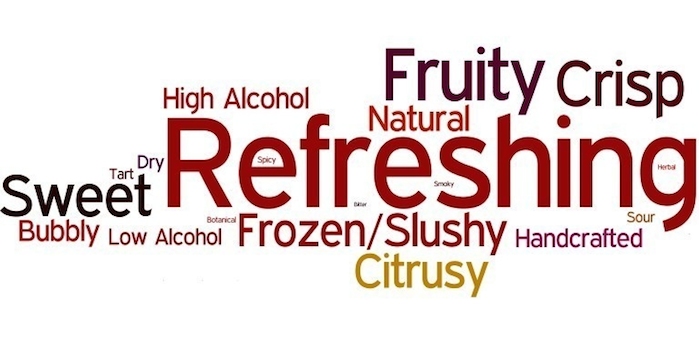Nearly two thirds (65%) of drinking-age Americans say “refreshing” is what they’re most likely to look for in an alcohol beverage this summer.
This is among the results of a recent study done by The Harrison Poll of 1,975 U.S. adults aged 21+ (1,356 who drink alcohol at least several times a year, “regular drinkers,” and 1,296 who plan to drink alcohol this summer, “summer drinkers”) surveyed online between June 27 and 29, 2016.
Following refreshing, summer drinkers are also looking for fruity (38%), crisp (33%), and sweet (30%) beverages, with about a quarter also aiming for something citrusy (25%), or frozen/slushy (24%).
Flavor preferences do differ by gender. Women are more than twice as likely as men to seek something fruity (51% vs. 24%), and women are also more likely to prefer:
- Sweet (38% women vs. 22% men);
- Citrusy (29% vs. 20%);
- Frozen/slushy (34% vs. 13%); and/or,
- Bubbly (20% vs. 11%).
Men, on the other hand, are more likely to desire something natural (23% vs. 14% women) or handcrafted (18% vs. 9%). While less popular in total compared to other characteristics, men also preferred spicy, smoky, or bitter drinks more so than women.
When it comes to the summer season, there’s no shortage of outdoor places to enjoy a drink. Nearly 6 in 10 regular drinkers (58%) are more likely to “day drink” in the summer than any other season and 8 in 10 (80%) say they enjoy drinking outdoors at this time of year.
An overwhelming 9 in 10 adults who plan to drink this summer plan to do so outside in any number of settings, the most popular of which is at a barbeque (65%), followed by a picnic (43%), around a pool (41%), or at the beach (39%). About 3 in 10 will be tipping it back at a patio bar (32%) or sporting event (30%), with around 2 in 10 each looking forward to a beverage at a concert/theater (23%) or a festival – beer related (18%) or not (18%).
Even outdoor locations that are fewer in number overall were mentioned, such as beer gardens (17%) and rooftop bars (14%).
Some locations are particularly popular among Millennials (aged 21-34), including:
- BBQs (76%);
- Beaches (56%);
- Around a pool (56%); and/or,
- Sporting events (40%).
Summer drinkers’ favorite alcohol beverage to drink between May and August is beer, followed by spirits/cocktails, while some just want “something fruity” or “anything cold and tasty.” Among those who drink each type of alcohol at least several times a year, substantial percentages of adults 21+ are more likely to enjoy the following during the summer compared to other times of the year:
- Flavored malt beverages (47%);
- Craft beer in a bottle (45%);
- Hard cider (34%);
- Hard soda (33%);
- Hard seltzer (27%); and
- Rose’ wine (20%; rises to 38% among females 21-34).
This Harris Poll was conducted online in English. Figures for age, sex, race/ethnicity, education, region and household income were weighted where necessary to bring them into line with their actual proportions in the population. Propensity score weighting was also used to adjust for respondents’ propensity to be online.
All sample surveys and polls, whether or not they use probability sampling, are subject to multiple sources of error which are most often not possible to quantify or estimate, including sampling error, coverage error, error associated with nonresponse, error associated with question wording and response options, and post-survey weighting and adjustments. Therefore, The Harris Poll avoids the words “margin of error” as they are misleading. All that can be calculated are different possible sampling errors with different probabilities for pure, unweighted, random samples with 100% response rates. These are only theoretical because no published polls come close to this ideal.
Respondents for this survey were selected from among those who have agreed to participate in Harris Poll surveys. The data have been weighted to reflect the composition of the adult population. Because the sample is based on those who agreed to participate in our panel, no estimates of theoretical sampling error can be calculated.





